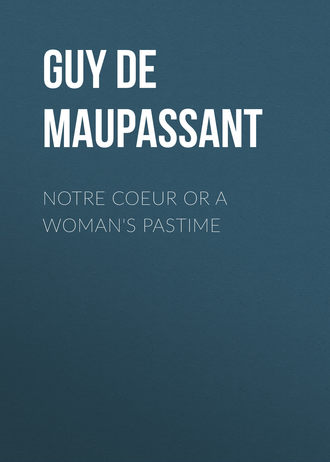
Ги де Мопассан
Notre Coeur or A Woman's Pastime
It was in this way that Massival brought his comrade André Mariolle to the house. A servant in black announced these names: "Monsieur Massival! Monsieur Mariolle!"
Beneath a great rumpled cloud of pink silk, a huge shade that was casting down upon a square table with a top of ancient marble the brilliant light of a lamp supported by a lofty column of gilded bronze, one woman's head and three men's heads were bent over an album that Lamarthe had brought in with him. Standing between them, the novelist was turning the leaves and explaining the pictures.
As they entered the room, one of the heads was turned toward them, and Mariolle, as he stepped forward, became conscious of a bright, blond face, rather tending to ruddiness, upon the temples of which the soft, fluffy locks of hair seemed to blaze with the flame of burning brushwood. The delicate retroussé nose imparted a smiling expression to this countenance, and the clean-cut mouth, the deep dimples in the cheeks, and the rather prominent cleft chin, gave it a mocking air, while the eyes, by a strange contrast, veiled it in melancholy. They were blue, of a dull, dead blue as if they had been washed out, scoured, used up, and in the center the black pupils shone, round and dilated. The strange and brilliant glances that they emitted seemed to tell of dreams of morphine, or perhaps, more simply, of the coquettish artifice of belladonna.
Mme. de Burne arose, gave her hand, thanked and welcomed them.
"For a long time I have been begging my friends to bring you to my house," she said to Mariolle, "but I always have to tell these things over and over again in order to get them done."
She was tall, elegantly shaped, rather deliberate in her movements, modestly décolletée, scarcely showing the tips of her handsome shoulders, the shoulders of a red-headed woman, that shone out marvelously under the light. And yet her hair was not red, but of the inexpressible color of certain dead leaves that have been burned by the frosts of autumn.
She presented M. Mariolle to her father, who bowed and shook hands.
The men were conversing familiarly together in three groups; they seemed to be at home, in a kind of club that they were accustomed to frequent, to which the presence of a woman imparted a note of refinement.
Big Fresnel was chatting with the Comte de Marantin. Fresnel's frequent visits to this house and the preference that Mme. de Burne evinced for him shocked and often provoked her friends. Still young, but with the proportions of a drayman, always puffing and blowing, almost beardless, his head lost in a vague cloud of light, soft hair, commonplace, tiresome, ridiculous, he certainly could have but one merit in the young woman's eyes, a merit that was displeasing to the others but indispensable to her, – that of loving her blindly. He had received the nickname of "The Seal." He was married, but never said anything about bringing his wife to the house. It was said that she was very jealous in her seclusion.
Lamarthe and Massival especially evinced their indignation at the evident sympathy of their friend for this windy person, and when they could no longer refrain from reproaching her with this reprehensible inclination, this selfish and vulgar liking, she would smile and answer:
"I love him as I would love a great, big, faithful dog."
George de Maltry was entertaining Gaston de Lamarthe with the most recent discovery, not yet fully developed, of the micro-biologists. M. de Maltry was expatiating on his theme with many subtile and far-reaching theories, and the novelist accepted them enthusiastically, with the facility with which men of letters receive and do not dispute everything that appears to them original and new.
The philosopher of "high life," fair, of the fairness of linen, slender and tall, was incased in a coat that fitted very closely about the hips. Above, his pale, intelligent face emerged from his white collar and was surmounted by smooth, blond hair, which had the appearance of being glued on.
As to Lamarthe, Gaston de Lamarthe, to whom the particle that divided his name had imparted some of the pretensions of a gentleman and man of the world, he was first, last, and all the time a man of letters, a terrible and pitiless man of letters. Provided with an eye that gathered in images, attitudes, and gestures with the rapidity and accuracy of the photographer's camera, and endowed with penetration and the novelist's instinct, which were as innate in him as the faculty of scent is in a hound, he was busy from morning till night storing away impressions to be used afterward in his profession. With these two very simple senses, a distinct idea of form and an intuitive one of substance, he gave to his books, in which there appeared none of the ordinary aims of psychological writers, the color, the tone, the appearance, the movement of life itself.
Each one of his novels as it appeared excited in society curiosity, conjecture, merriment, or wrath, for there always seemed to be prominent persons to be recognized in them, only faintly disguised under a torn mask; and whenever he made his way through a crowded salon he left a wake of uneasiness behind him. Moreover, he had published a volume of personal recollections, in which he had given the portraits of many men and women of his acquaintance, without any clearly defined intention of unkindness, but with such precision and severity that they felt sore over it. Some one had applied to him the sobriquet, "Beware of your friends." He kept his secrets close-locked within his breast and was a puzzle to his intimates. He was reputed to have once passionately loved a woman who caused him much suffering, and it was said that after that he wreaked his vengeance upon others of her sex.
Massival and he understood each other very well, although the musician was of a very different disposition, more frank, more expansive, less harassed, perhaps, but manifestly more impressible. After two great successes – a piece performed at Brussels and afterward brought to Paris, where it was loudly applauded at the Opéra-Comique; then a second work that was received and interpreted at the Grand Opéra as soon as offered – he had yielded to that species of cessation of impulse that seems to smite the greater part of our contemporary artists like premature paralysis. They do not grow old, as their fathers did, in the midst of their renown and success, but seem threatened with impotence even when in the very prime of life. Lamarthe was accustomed to say: "At the present day there are in France only great men who have gone wrong."
Just at this time Massival seemed very much smitten with Mme. de Burne, so that every eye was turned upon him when he kissed her hand with an air of adoration. He inquired:
"Are we late?"
She replied:
"No, I am still expecting the Baron de Gravil and the Marquise de Bratiane."
"Ah, the Marquise! What good luck! We shall have some music this evening, then."
"I hope so."
The two laggards made their appearance. The Marquise, a woman perhaps a little too diminutive, Italian by birth, of a lively disposition, with very black eyes and eyelashes, black eyebrows, and black hair to match, which grew so thick and so low down that she had no forehead to speak of, her eyes even being threatened with invasion, had the reputation of possessing the most remarkable voice of all the women in society.
The Baron, a very gentlemanly man, hollow-chested and with a large head, was never really himself unless he had his violoncello in his hands. He was a passionate melomaniac, and only frequented those houses where music received its due share of honor.
Dinner was announced, and Mme. de Burne, taking André Mariolle's arm, allowed her guests to precede her to the dining-room; then, as they were left together, the last ones in the drawing-room, just as she was about to follow the procession she cast upon him an oblique, swift glance from her pale eyes with their dusky pupils, in which he thought that he could perceive more complexity of thought and more curiosity of interest than pretty women generally bestow upon a strange gentleman when receiving him at dinner for the first time.
The dinner was monotonous and rather dull. Lamarthe was nervous, and seemed ill disposed toward everyone, not openly hostile, for he made a point of his good-breeding, but displaying that almost imperceptible bad humor that takes the life out of conversation. Massival, abstracted and preoccupied, ate little, and from time to time cast furtive glances at the mistress of the house, who seemed to be in any place rather than at her own table. Inattentive, responding to remarks with a smile and then allowing her face to settle back to its former intent expression, she appeared to be reflecting upon something that seemed greatly to preoccupy her, and to interest her that evening more than did her friends. Still she contributed her share to the conversation – very amply as regarded the Marquise and Mariolle, – but she did it from habit, from a sense of duty, visibly absent from herself and from her abode. Fresnel and M. de Maltry disputed over contemporary poetry. Fresnel held the opinions upon poetry that are current among men of the world, and M. de Maltry the perceptions of the spinners of most complicated verse – verse that is incomprehensible to the general public.
Several times during the dinner Mariolle had again encountered the young woman's inquiring look, but more vague, less intent, less curious. The Marquise de Bratiane, the Comte de Marantin, and the Baron de Gravil were the only ones who kept up an uninterrupted conversation, and they had quantities of things to say.
After dinner, during the course of the evening, Massival, who had kept growing more and more melancholy, seated himself at the piano and struck a few notes, whereupon Mme. de Burne appeared to awake and quickly organized a little concert, the numbers of which comprised the pieces that she was most fond of.
The Marquise was in voice, and, animated by Massival's presence, she sang like a real artist. The master accompanied her, with that dreamy look that he always assumed when he sat down to play. His long hair fell over the collar of his coat and mingled with his full, fine, shining, curling beard. Many women had been in love with him, and they still pursued him with their attentions, so it was said. Mme. de Burne, sitting by the piano and listening with all her soul, seemed to be contemplating him and at the same time not to see him, and Mariolle was a little jealous. He was not particularly jealous because of any relation that there was between her and him, but in presence of that look of a woman fixed so intently upon one of the Illustrious he felt himself humiliated in his masculine vanity by the consciousness of the rank that They bestow on us in proportion to the renown that we have gained. Often before this he had secretly suffered from contact with famous men whom he was accustomed to meet in the presence of those beings whose favor is by far the dearest reward of success.
About ten o'clock the Comtesse de Frémines and two Jewesses of the financial community arrived, one after the other. The talk was of a marriage that was on the carpet and a threatened divorce suit. Mariolle looked at Madame de Burne, who was now seated beneath a column that sustained a huge lamp. Her well-formed, tip-tilted nose, the dimples in her cheeks, and the little indentation that parted her chin gave her face the frolicsome expression of a child, although she was approaching her thirtieth year, and something in her glance that reminded one of a withering flower cast a shade of melancholy over her countenance. Beneath the light that streamed upon it her skin took on tones of blond velvet, while her hair actually seemed colored by the autumnal sun which dyes and scorches the dead leaves.
She was conscious of the masculine glance that was traveling toward her from the other end of the room, and presently she arose and went to him, smiling, as if in response to a summons from him.
"I am afraid you are somewhat bored," she said. "A person who has not got the run of a house is always bored."
He protested the contrary. She took a chair and seated herself by him, and at once the conversation began to be animated. It was instantaneous with both of them, like a fire that blazes up brightly as soon as a match is applied to it. It seemed as if they had imparted their sensations and their opinions to each other beforehand, as if a similarity of disposition and education, of tastes and inclinations, had predisposed them to a mutual understanding and fated them to meet.
Perhaps there may have been a little artfulness on the part of the young woman, but the delight that one feels in encountering one who is capable of listening, who can understand you and reply to you and whose answers give scope for your repartees, put Mariolle into a fine glow of spirits. Flattered, moreover, by the reception which she had accorded him, subjugated by the alluring favor that she displayed and by the charm which she knew how to use so adroitly in captivating men, he did his best to exhibit to her that shade of subdued but personal and delicate wit which, when people came to know him well, had gained for him so many and such warm friendships.
She suddenly said to him:
"Really, it is very pleasant to converse with you, Monsieur. I had been told that such was the case, however."
He was conscious that he was blushing, and replied at a venture:
"And I had been told, Madame, that you were – "
She interrupted him:
"Say a coquette. I am a good deal of a coquette with people whom I like. Everyone knows it, and I do not attempt to conceal it from myself, but you will see that I am very impartial in my coquetry, and this allows me to keep or to recall my friends without ever losing them, and to retain them all about me."
She said this with a sly air which was meant to say: "Be easy and don't be too presumptuous. Don't deceive yourself, for you will get nothing more than the others."
He replied:
"That is what you might call warning your guests of the perils that await them here. Thank you, Madame: I greatly admire your mode of procedure."
She had opened the way for him to speak of herself, and he availed himself of it. He began by paying her compliments and found that she was fond of them; then he aroused her woman's curiosity by telling her what was said of her in the different houses that he frequented. She was rather uneasy and could not conceal her desire for further information, although she affected much indifference as to what might be thought of herself and her tastes. He drew for her a charming portrait of a superior, independent, intelligent, and attractive woman, who had surrounded herself with a court of eminent men and still retained her position as an accomplished member of society. She disclaimed his compliments with smiles, with little disclaimers of gratified egotism, all the while taking much pleasure in the details that he gave her, and in a playful tone kept constantly asking him for more, questioning him artfully, with a sensual appetite for flattery.
As he looked at her, he said to himself, "She is nothing but a child at heart, just like all the rest of them"; and he went on to finish a pretty speech in which he was commending her love for art, so rarely found among women. Then she assumed an air of mockery that he had not before suspected in her, that playfully tantalizing manner that seems inherent in the French. Mariolle had overdone his eulogy; she let him know that she was not a fool.
"Mon Dieu!" she said, "I will confess to you that I am not quite certain whether it is art or artists that I love."
He replied: "How could one love artists without being in love with art?"
"Because they are sometimes more comical than men of the world."
"Yes, but they have more unpleasant failings."
"That is true."
"Then you do not love music?"
She suddenly dropped her bantering tone. "Excuse me! I adore music; I think that I am more fond of it than of anything else. And yet Massival is convinced that I know nothing at all about it."
"Did he tell you so?"
"No, but he thinks so."
"How do you know?"
"Oh! we women guess at almost everything that we don't know."
"So Massival thinks that you know nothing of music?"
"I am sure of it. I can see it only by the way that he has of explaining things to me, by the way in which he underscores little niceties of expression, all the while saying to himself: 'That won't be of any use, but I do it because you are so nice.'"
"Still he has told me that you have the best music in your house of any in Paris, no matter whose the other may be."
"Yes, thanks to him."
"And literature, are you not fond of that?"
"I am very fond of it; and I am even so audacious as to claim to have a very good perception of it, notwithstanding Lamarthe's opinion."
"Who also decides that you know nothing at all about it?"
"Of course."
"But who has not told you so in words, any more than the other."
"Pardon me; he is more outspoken. He asserts that certain women are capable of showing a very just and delicate perception of the sentiments that are expressed, of the truthfulness of the characters, of psychology in general, but that they are totally incapable of discerning the superiority that resides in his profession, its art. When he has once uttered this word, Art, all that is left one to do is to show him the door."
Mariolle smiled and asked:
"And you, Madame, what do you think of it?"
She reflected for a few seconds, then looked him straight in the face to see if he was in a frame of mind to listen and to understand her.
"I believe that sentiment, you understand – sentiment – can make a woman's mind receptive of everything; only it is frequently the case that what enters does not remain there. Do you follow me?"
"No, not fully, Madame."
"Very well! To make us comprehensive to the same degree as you, our woman's nature must be appealed to before addressing our intelligence. We take no interest in what a man has not first made sympathetic to us, for we look at all things through the medium of sentiment. I do not say through the medium of love; no, – but of sentiment, which has shades, forms, and manifestations of every sort. Sentiment is something that belongs exclusively to our domain, which you men have no conception of, for it befogs you while it enlightens us. Oh! I know that all this is incomprehensible to you, the more the pity! In a word, if a man loves us and is agreeable to us, for it is indispensable that we should feel that we are loved in order to become capable of the effort – and if this man is a superior being, by taking a little pains he can make us feel, know, and possess everything, everything, I say, and at odd moments and by bits impart to us the whole of his intelligence. That is all often blotted out afterward; it disappears, dies out, for we are forgetful. Oh! we forget as the wind forgets the words that are spoken to it. We are intuitive and capable of enlightenment, but changeable, impressionable, readily swayed by our surroundings. If I could only tell you how many states of mind I pass through that make of me entirely different women, according to the weather, my health, what I may have been reading, what may have been said to me! Actually there are days when I have the feelings of an excellent mother without children, and others when I almost have those of a cocotte without lovers."
Greatly pleased, he asked: "Is it your opinion that intelligent women generally are gifted with this activity of thought?"
"Yes," she said. "Only they allow it to slumber, and then they have a life shaped for them which draws them in one direction or the other."
Again he questioned: "Then in your heart of hearts it is music that you prefer above all other distractions?"
"Yes! But what I was telling you just now is so true! I should certainly never have enjoyed it as I do enjoy it, adored it as I do adore it, had it not been for that angelic Massival. He seems to have given me the soul of the great masters by teaching me to play their works, of which I was passionately fond before. What a pity that he is married!"
She said these last words with a sprightly air, but so regretfully that they threw everything else into shadow, her theories upon women and her admiration for art.
Massival was, in fact, married. Before the days of his success he had contracted one of those unions that artists make and afterward trail after them through their renown until the day of their death. He never mentioned his wife's name, never presented her in society, which he frequented a great deal; and although he had three children the fact was scarcely known.
Mariolle laughed. She was decidedly nice, was this unconventional woman, pretty, and of a type not often met with. Without ever tiring, with a persistency that seemed in no wise embarrassing to her, he kept gazing upon that face, grave and gay and a little self-willed, with its audacious nose and its sensual coloring of a soft, warm blonde, warmed by the midsummer of a maturity so tender, so full, so sweet that she seemed to have reached the very year, the month, the minute of her perfect flowering. He wondered: "Is her complexion false?" And he looked for the faint telltale line, lighter or darker, at the roots of her hair, without being able to discover it.
Soft footsteps on the carpet behind him made him start and turn his head. It was two servants bringing in the tea-table. Over the blue flame of the little lamp the water bubbled gently in a great silver receptacle, as shining and complicated as a chemist's apparatus.
"Will you have a cup of tea?" she asked.
Upon his acceptance she arose, and with a firm step in which there was no undulation, but which was rather marked by stiffness, proceeded to the table where the water was simmering in the depths of the machine, surrounded by a little garden of cakes, pastry, candied fruits, and bonbons. Then, as her profile was presented in clear relief against the hangings of the salon, Mariolle observed the delicacy of her form and the thinness of her hips beneath the broad shoulders and the full chest that he had been admiring a moment before. As the train of her light dress unrolled and dragged behind her, seemingly prolonging upon the carpet a body that had no end, this blunt thought arose to his mind: "Behold, a siren! She is altogether promising." She was now going from one to another, offering her refreshments with gestures of exquisite grace. Mariolle was following her with his eyes; but Lamarthe, who was walking about with his cup in his hand, came up to him and said:
"Shall we go, you and I?"
"Yes, I think so."
"We will go at once, shall we not? I am tired."
"At once. Come."
They left the house. When they were in the street, the novelist asked:
"Are you going home or to the club?"
"I think that I will go and spend an hour at the club."
"At the Tambourins?"
"Yes."
"I will go as far as the door with you. Those places are tiresome to me; I never put my foot in them. I join them only because they enable me to economize in hack-hire."
They locked arms and went down the street toward Saint Augustin. They walked a little way in silence; then Mariolle said:
"What a singular woman! What do you think of her?"
Lamarthe began to laugh outright. "It is the commencement of the crisis," he said. "You will have to pass through it, just as we have all done. I have had the malady, but I am cured of it now. My dear friend, the crisis consists of her friends talking of nothing but of her when they are together, whenever they chance to meet, wherever they may happen to be."
"At all events, it is the first time in my case, and it is very natural for me to ask for information, since I scarcely know her."
"Let it be so, then; we will talk of her. Well, you are bound to fall in love with her. It is your fate, the lot that is shared by all."
"She is so very seductive, then?"
"Yes and no. Those who love the women of other days, women who have a heart and a soul, women of sensibility, the women of the old-fashioned novel, cannot endure her and execrate her to such a degree as to speak of her with ignominy. We, on the other hand, who are disposed to look favorably upon what is modern and fresh, are compelled to confess that she is delicious, provided always that we don't fall in love with her. And that is just exactly what everybody does. No one dies of the complaint, however; they do not even suffer very acutely, but they fume because she is not other than she is. You will have to go through it all if she takes the fancy; besides, she is already preparing to snap you up."
Mariolle exclaimed, in response to his secret thought:
"Oh! I am only a chance acquaintance for her, and I imagine that she values acquaintances of all sorts and conditions."
"Yes, she values them, parbleu! and at the same time she laughs at them. The most celebrated, even the most distinguished, man will not darken her door ten times if he is not congenial to her, and she has formed a stupid attachment for that idiotic Fresnel, and that tiresome De Maltry. She inexcusably suffers herself to be carried away by those idiots, no one knows why; perhaps because she gets more amusement out of them than she does out of us, perhaps because their love for her is deeper; and there is nothing in the world that pleases a woman so much as to be loved like that."
And Lamarthe went on talking of her, analyzing her, pulling her to pieces, correcting himself only to contradict himself again, replying with unmistakable warmth and sincerity to Mariolle's questions, like a man who is deeply interested in his subject and carried away by it; a little at sea also, having his mind stored with observations that were true and deductions that were false. He said:
"She is not the only one, moreover; at this minute there are fifty women, if not more, who are like her. There is the little Frémines who was in her drawing-room just now; she is Mme. de Burne's exact counterpart, save that she is more forward in her manners and married to an outlandish kind of fellow, the consequence of which is that her house is one of the most entertaining lunatic asylums in Paris. I go there a great deal."
Without noticing it, they had traversed the Boulevard Malesherbes, the Rue Royale, the Avenue des Champs-Élysées, and had reached the Arc de Triomphe, when Lamarthe suddenly pulled out his watch.
"My dear fellow," he said, "we have spent an hour and ten minutes in talking of her; that is sufficient for to-day. I will take some other occasion of seeing you to your club. Go home and go to bed; it is what I am going to do."







